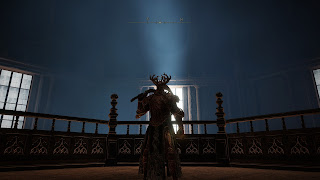The Dead God
Amidst
a landscape of billowing dust and unrelenting haze, the dead god lay
like a mountain, its vast bulk rising out of the dirt to precipitous
heights, birds encircling the crest of its brow, which was furrowed
in death, forming an expression of perpetual confusion. How could a
god die? Gods were eternal; they lasted while the world wore away to
slivers of bone and fossilized forests. Still, it was the age of
apostasy. He walked roads that were nothing but faint outlines in the
dirt, and every glimpse of a structure revealed crumbling stones that
were more imagination than outline. Sometimes he would stop and bend
down to investigate something in the rubble but the object would
always be formless, a heap of unidentifiable material, brown or tan,
baked by the merciless rays of the sun. He looked, though, as he
would always look. There were small ways of keeping faith.
The
god seemed to last in his perspective forever, and it wasn’t until
he crossed the event horizon that the body began to grow in magnitude
exponentially, as though it were moving toward him rather than he
trekking toward it. As the distance closed, he kept stopping and
staring, straining his eyes, looking for any tremor or tell that the
mountain slumbered instead of rotted. But then the smell hit him, a
profound reek, and he had to cover his face and blink his watering
eyes. What life that remained in this place were dissembling the
corpse, working the copious amount of flesh and sinew into their
baser elements. Leathery skin hung in great straps; flies and beetles
nested in the dried flesh while birds had eaten out its eyes and
roosted in the hollow sockets of its orbits. Over the many weeks it
had taken to cross the great desert he had seen almost nothing that
walked under its own power; a tiny lizard under a stone; a fly
landing on his perspiring brow. There was more life writhing through
the dead god than in all of the desolate waste, and it horrified him
to bear witness to it, made his empty stomach clench and heave at the
grotesqueness squirming before his eyes. Are we all parasites
he uttered, and his voice stirred the flesh, made it tremble until a
cavity opened and two great doors peeled back to release several
crested things that stood in the shadow of the god as he retreated to
the brightness of the sunlight. They had long beaks and bone-like
protrusions jutting from their skulls, and their bodies were
long-limbed and diminutive, stunted torsos meant for climbing and
scampering. Their lengthy fingers ended in talons that gleamed in the
dark shadows, and though he could see no eyes in their heads, he
could feel their gaze as they waited for a legible sign. From the
sheathe at his hip he removed his sword, and the light glittered on
the metal blade, and the creatures, eyeless or not, read his
intentions and retreated back into the depths from which they came.
Monsters from Rian’s fantasies.
His brother had enjoyed tales from foreign lands, hearsay and
merchants’ rumors. Yet he lingered still in the castle, locked away
in his sequester, shunning the light and the heat and the decay
festering about him. He hadn’t wanted to leave, had seen no reason
for it. It is safe and cool here. There is water and
servants and food of a sort. I hear the echo of conversation and that
is enough. Nothing that you seek is true. Our parents have told you
lies.
A
shimmering caught his eye. One of the great appendages lay
outstretched, palm turned upward, the soft meat of the hand gone now,
leaving almost nothing but bone, but there was a shard jutting from a
cuticle, blade-like, gleaming. A three-foot long splinter of
fingernail so sharp that it cut the thick leather of his glove as he
reached for it. Only a sudden shadow thrown across the desert before
him warned of the beast leaping for his back. With a tremendous heave
he pulled the shard loose and swung it in one motion, letting its
momentum turn his body like a gyroscope. A head fell free of a body,
its crested skull landing softly in the sand. He bent down and picked
it up, examining the black blood dripping like oil from its neck.
There were no eyes, only taut skin, and the beak had tiny teeth like
a saw-blade. He didn’t
think the others would bother him now, and why this one had decided
to pursue fresh meat instead of feasting on divine flesh perplexed.
The lips of the cavity
trembled and glistened, quivering with subsurface activity. He would
not be going through there, even if there weren’t monsters
inhabiting the body.
He
stepped onto the hand and began to climb the god’s forearm, using
the shattered blade of his sword as a pick, the shard of fingernail
carefully wrapped in cloth and tied to his back. The desert sun
lowered, sending shadows across the waste, and it was dark by the
time he reached the summit of the god’s shoulder. There, on its
anterior deltoid, he made camp.
























